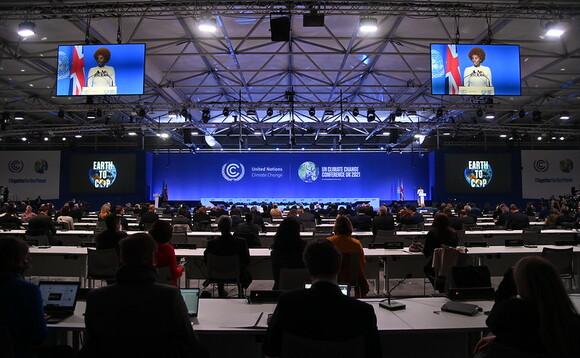Credit: Karwai Tang / UK government
The talks have cruised past their scheduled close with reports indicating that key groups of countries remain divided on a number of crucial issues
Prime Minister Boris Johnson's prediction earlier this week that COP26 Climate Summit may need to stretch into "extra time" has come to pass, with the negotiations cruising past their scheduled close of 6pm this evening.
COP26 President Alok Sharma has repeatedly stressed over the past two weeks that he wanted the Summit to close on time, but it now appears certain that a conclusion will not come until Saturday at the earliest with negotiating blocs said to be divided on a raft of contentious issues.
Talks are on-going around how to strengthen national climate action plans in pursuit of 1.5C, how to increase flows of climate finance, whether the draft text should explicitly reference fossil fuels, and how to reform carbon markets. In addition, a serious row is understood to have kicked off over how to strengthen proposed mechanisms for providing poorer nations with funding for loss and damage caused by climate change.
Earlier, a lengthy stocktaking session that followed the publication of this morning's draft cover texts saw countries' lead negotiators and climate ministers set out their positions on the latest draft texts, highlighting the many challenges that will have to be overcome if a deal is to be done in Glasgow.
The atmosphere was broadly collegiate, but the stocktake underscored that there remain clear differences on a number of crucial issues.
EU Commission Vice President for a Green Deal Frans Timmermans gave an emotional speech to fellow country delegations in the main plenary hall, as he took out a photo of his one-year-old grandson in a bid to highlight what is at stake in the climate negotiations.
"This is personal, this is not about politics," he insisted. "We need to make sure major emitters reduce their emissions so that we keep 1.5 alive. That needs to be at the heart of our conclusions today. We need to be able to say when we meet again in Egypt next year, we've done it, we're on track for 1.5."
Timmermans also signalled that the EU was keen to mobilise "a lot more financial firepower", including through special drawing rights (SDRs), to help boost climate finance for developing nations. But observers continue to accuse the EU of failing to stump up the levels of climate finance needed to secure the support of poorer nations for a an ambitious deal.
Neither Timmermans, nor US Climate Envoy John Kerry - who spoke not long after his EU counterpart - appeared to offer much in the way of new proposals to help tackle the deadlocks that are marring the negotiations on issues such as climate finance and loss and damage.
Kerry unequivocally signalled that key sections in the draft decision text on enhancing national climate plans and phasing out unabated coal power and inefficient fossil fuel subsidies must stay, including the request for nations to come back with more ambitious NDCs next year.
"We cannot go weaker, we cannot go back from here," said Kerry. "That language must stay."
However, other countries are thought to be opposed to the proposals and Saudi Arabia offered a thinly-veiled hint that the country is resisting the calls to move nationally determined contribution (NDC) updates onto a faster timetable than that currently set out under the Paris Agreement, which is every five years.
"No one disagrees in the room [on 1.5C being safer climate territory], the question is how we are going to do that," he said, urging parties to "keep us all faithful to the agreement we have all agreed in Paris in 2015".
China's environment minister Zhao Yingmin also signalled that the world's biggest emitter remains steadfastly resolute in its position, as he pushed back against efforts to ensure countries come back in 2022 with another updated national climate plan. He said China is seeking a more "inclusive solution" on common time frames.
The final draft decision text should stay committed to global temperature goal of 'well below' 2C and to pursue 1.5C, he said, adding that "to keep 1.5C within reach it requires all the parties to conduct action to enhance cooperation under the principle of common but differentiated responsibilities".
On enhanced transparency, meanwhile, Yingmin called for "more flexibility for developing countries" and more "capacity support" for these nations in implementing these transparency frameworks.
In addition, a number of Ministers from developing nations repeatedly called on the Presidency to strengthen commitments on climate finance and funding for loss and damage.
Meanwhile, a group of senior observers of the talks this afternoon warned the negotiations are at risk of failure due to to escalating row over loss and damage proposals.
Alden Meyer of think tank E3G said the G77 group of developing economies were "very unified" in their demand for a more ambitious text on plans for a formal mechanism for mobilising loss and damage funding, warning that unless richer nations are willing to compromise "we're not going to get out of here tonight or tomorrow... we're not going to get the kind of agreement we need".
He argued that the US and EU had a moral responsibility to step up and agree a framework for delivering loss and damage funds in the future, and argued it was in the strategic interest of the two superpowers to help tackle the issue so as to help curb migratory pressures and secure support from developing nations for the mitigation measures industrialised nations want to see included in the final text.
Mohamed Adow of think tank Power Shift Africa accused the UK Presidency of this morning tabling a draft cover text that on loss and damage reflected a "lowest common denominator view" of the negotiations from last night. He said a large majority of countries wanted a more ambitious package and that the text should "reflect where the world stands".
There had been hopes within the Presidency that the Loss and Damage text represented a significant step forward for talks that for years have largely sidelined the issue for years, especially given the past few weeks have seen the first sums committed to loss and damage funds.
But the G77 now appears adamant that the text needs strengthening to provide clearer assurances that a process really will kick off to ensure loss and damage funds are consistently delivered. However, industrialised nations have long been deeply wary of any proposals that could be interpreted as them accepting liability for loss and damages related to climate change.
Outside the negotiations, both green groups and the business community are keeping up the pressure for an ambitious outcome in Glasgow.
We Mean Business CEO Maria Mendiluce said the demands from business was "crystal clear".
"Business urges countries to be crystal clear in the COP26 text that the end of coal power and fossil fuel subsidies is both inevitable and in sight. Over 750 companies from across the world are urging govts to phase out coal-fired power generation by 2030 for developed countries and by 2040 for other countries. This along with an end to fossil fuel subsidies by 2025 is the timeline business needs to help get us on track. Anything less is incompatible with limiting global temperature rise to 1.5C."









